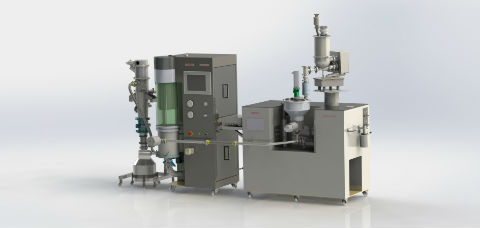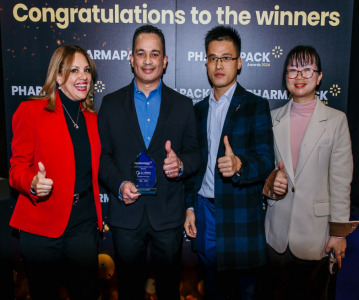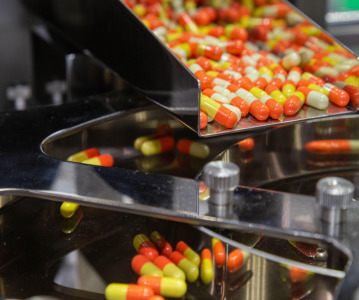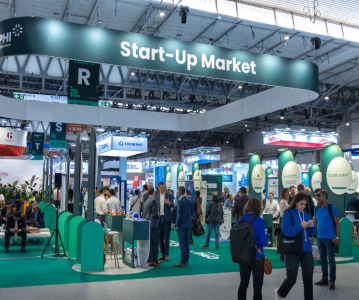The shortest way from the lab to continuous production

The new Xelum R&D by Bosch.
Bosch's new Xelum R&D for continuous production of oral solid dosage forms ensures a short time-to-market and optimum dosing of APIs.
At Achema 2018, Bosch Packaging Technology introduces its latest R&D device for the continuous production of oral solid dosage (OSD) forms.
The platform ensures a short time-to-market and optimum dosing of APIs. “The new laboratory device is based on our Xelum production platform that we presented last year,” says Fritz-Martin Scholz, product manager at the Bosch subsidiary Hüttlin. “The separated process steps of batch production take place one after the other and without interruption. This leads to shorter cycle times, lower production costs and high flexibility.” With the Xelum R&D, Bosch offers a platform that offers an ideal start to continuous manufacturing.
Precise and reliable dosing
As opposed to the common complex mass flow rate, excipients and active ingredients are dosed as a discrete mass in the Xelum R&D. This makes it possible to dose even smallest amounts of APIs of less than one percent. The system doses, mixes and granulates individual packages, so-called X-keys, which continuously run through the process chain and are removed successively from the machine as packages into bins. “This way we reduce not only process complexity, but also the system’s failure susceptibility, while increasing both accuracy and quality of the end product. Moreover, the product is traceable at all times,” says Scholz. Depending on requirements, up to four loss-in-weight feeders can be used.
Since the Xelum R&D uses the same components for dosing, mixing and granulating as the Xelum production platform from Bosch, process parameters are identical and can be directly transferred 1:1. “Scale-up becomes obsolete, which reduces development time and API usage, since elaborate tests are no longer necessary,” Scholz explains. Material flow from dosing to emptying takes place in a closed process (bin-to-bin) to ensure the highest safety.
The benefits of the fluid bed
Current continuous production systems for wet granulation mostly use twin screw granulators. The Xelum system relies on fluid bed processors – based on a proven technology developed by the Bosch subsidiary Hüttlin. In the fluid bed, granulation and drying take place in the same process chamber. “This eliminates the need to transfer wet granules, which in turn has a positive effect on the system’s reliability,” Scholz emphasizes. Pharmaceutical manufacturers obtain granulates with the desired characteristics – including unimodal particle size distribution, as well as excellent flow and tableting properties combined with high production yields.
The controls of the Xelum R&D correspond to a modern production system. All relevant process parameters are continuously recorded. Both the production and the product transfer, as well as the cleaning process are recipe-controlled and ensure reproducible results. The user-friendly handling of the system is complemented by a DoE (Design of Experiment) software support.

Related News
-
News Pharmapack Awards 2024 Patient-Centric Design Award Winner – Dr Ferrer BioPharma
The 2024 Pharmapack Awards celebrated the best in innovation and design for the pharmaceutical packaging and drug delivery industry on January 24, 2024. -
News Women in Pharma: Minding the Gap at Pharmapack 2024
2024 marks the first year Pharmapack will host a Diversity track dedicated to bridging the gap within the pharmaceutical packaging and drug delivery sector. The track includes a panel discussion on 'Enabling Diversity in the Workplace,' focused... -
News Pharmapack Awards 2024 - Celebrating Packaging and Drug Delivery Innovation
The 2024 Pharmapack Innovation Awards ceremony celebrated the best in pharmaceutical packaging and drug delivery innovation at all levels. The awards were held on January 24, 2024 at the Paris Expo Porte de Versailles. -
News Pharmapack 2024 - From the Floor
Paris once again welcomes Europe’s leading trade show in pharmaceutical packaging and drug delivery innovation. Join our content team as Pharmapack 2024 opens its doors to leading experts and innovators in pharmaceutical packaging and drug delive... -
News CPHI Barcelona 2023: Partnering for Success – Managing Outsourcing Relationships to Optimise Manufacturing Operations
During CPHI Barcelona 2023, insightful content sessions offered attendees the chance to explore trending topics with expert speakers and panellists. Here, we summarise what the pharma industry and supply chain are talking about the most. -
News CPHI Barcelona 2023: Loading Potential – Artificial Intelligence for Pharma Manufacturing
During CPHI Barcelona 2023, insightful content sessions offered attendees the chance to explore trending topics with expert speakers and panellists. Here, we summarise what the pharma industry and supply chain are talking about the most. -
News Pharmaceutical industry supports COP28 health stance in joint statement
As COP28 takes place over this week in Dubai, UAE, several bodies in the pharmaceutical and health industries have come together to announce support of key movements in sustainability in the sector, and to recognise sustainability as a health issue.&nb... -
News CPHI Podcast Series: Start-ups take centre stage at CPHI Barcelona
The first episode of the CPHI Podcast Series since we attended CPHI Barcelona in October covers the Start-up market at the event, with expert Matthew Wise joining Editor Lucy Chard to discuss the event.
Position your company at the heart of the global Pharma industry with a CPHI Online membership
-
Your products and solutions visible to thousands of visitors within the largest Pharma marketplace
-
Generate high-quality, engaged leads for your business, all year round
-
Promote your business as the industry’s thought-leader by hosting your reports, brochures and videos within your profile
-
Your company’s profile boosted at all participating CPHI events
-
An easy-to-use platform with a detailed dashboard showing your leads and performance





.png)

